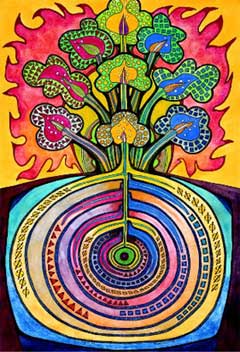-
Tarot terapéutico
El tarot Terapéutico tiene como objetivos sintonizar al individuo con su esencia e identificar y ayudar a resolver bloqueos, miedos y otros patrones de conducta que dificultan su realización integral.
-
La astrología Integral
La Astrología moderna, más que predecir el “destino” de los hombres o pronosticar los sucesos terrestres, se usa como una potente herramienta en el proceso individual de autoconocimiento. Esta doctrina, se basa en la influencia que ejerce en la vida de una persona la posición de los astros en el momento de nacer.

Tarot Terapéutico
“El futuro eres tú mismo, y la línea de futuro que sigues se construye con cada una de las decisiones que tomamos segundo a segundo, poco deja la naturaleza fuera de nuestro albedrío” El tarot Terapéutico tiene como… Read More

Astrología Integral
La Astrología moderna, más que predecir el “destino” de los hombres o pronosticar los sucesos terrestres, se usa como una potente herramienta en el proceso individual de autoconocimiento. Esta doctrina, se basa en la influencia que ejerce en… Read More

Kabbalah
La Kabbalah es un mapa y un plan detallados para tomar el control de tu vida y no dejar que la vida tome control de ti. La Kabbalah precede a cualquier religión o teología y fue dada a… Read More
Blog
Luna Nueva en Acuario. La liberación, el desapego y la flexibilidad.
Algunas zonas de obscuridad empezaran a iluminarse, obligándonos a hacer cambios que no hemos querido hacer en los años/meses pasados. Esta situación de incomodidad aunque en un principio se ve muy obscura, sin duda, es lo mejor que nos sucederá en mucho tiempo. Aprovechemos esta incomodidad y empecemos a mover las piezas del rompecabezas hacia los objetivos que queremos lograr.
¡Feliz Luna Nueva!
Luna Llena en Géminis
Las verdades salen a la luz con más brillo y claridad, para explorar e impulsar la expansión de nuestros propios horizontes.
Terminando ciclos: Luna Llena en Acuario
Nuestra responsabilidad es ser fieles a lo que queremos para nosotros en plena autenticidad. No tenemos que complacer a nadie. No tenemos que hacer nada para complacer a otros. No tenemos que actuar según los que los demás esperan de nosotros. Lo único que tenemos que hacer es honrar nuestros valores más altos, más preciados y cuidarnos en nuestro camino para hacerlos realidad. ¿Qué puedo transformar hoy en mi vida?
Kabbalah y Felicidad
Generalmente nosotros vamos por la vida pensando que todo lo que vemos es real y creemos que ya sabemos de que se trata todo esto, de que trata esta vida y este universo, sin embargo, nos vamos a dar cuenta con el tiempo que estamos muy equivocados.
La importancia de ser agradecido
Sentir gratitud y no expresarla es como envolver un regalo y no darlo

Luna Nueva en Géminis: Dejar ir para empezar un nuevo ciclo
Tenemos una segunda oportunidad para hacerlo todo bien y que no se estropee. No la dejes escapar y establece tus intenciones. Ni todo es tan sencillo, ni todo es gratis, pro sin duda saldrá bien. Es más, lo que se puede ganar, que lo que corremos el riesgo de perder.

Astrología China 2016: Año del Mono de Fuego
El 8 de febrero de 2016 dejamos el año de la cabra de madera Yin y le damos la bienvenida a la pasión Yang del mono de fuego. Comenzando junto con la Luna Nueva oficialmente el año del Mono de Fuego

La felicidad no se persigue, se construye
¿Te ha pasado alguna vez que tenías cierta meta que querías lograr, luchando incansablemente por llegar a ella pensando que eso haría que alcanzaras la felicidad, y cuando llegaste no te causo tanta satisfacción? O si te causó satisfacción tal vez duró menos de lo que pensabas. A todos nos pasa esto. Tenemos en nuestra cabeza ciertas metas y estamos seguros que cuando lleguemos a ellas nos vamos a sentir felices, pero una y otra vez, la realidad nos muestra que eso no ocurre.

El despertar
Llega un momento en la vida cuando finalmente te das cuenta… cuando, en medio de todos tus miedos y locura frenas en seco y de algún lugar esa voz dentro de tu cabeza grita: ¡sufiiciente!. Suficiente de llorar y quejarse, suficiente de culpas y aguantar sólo para mantenerte en pie. Entonces, como un niño después de un berrinche, te tranquilizas, te limpias las lágrimas y empiezas a mirar el mundo con otros ojos.







